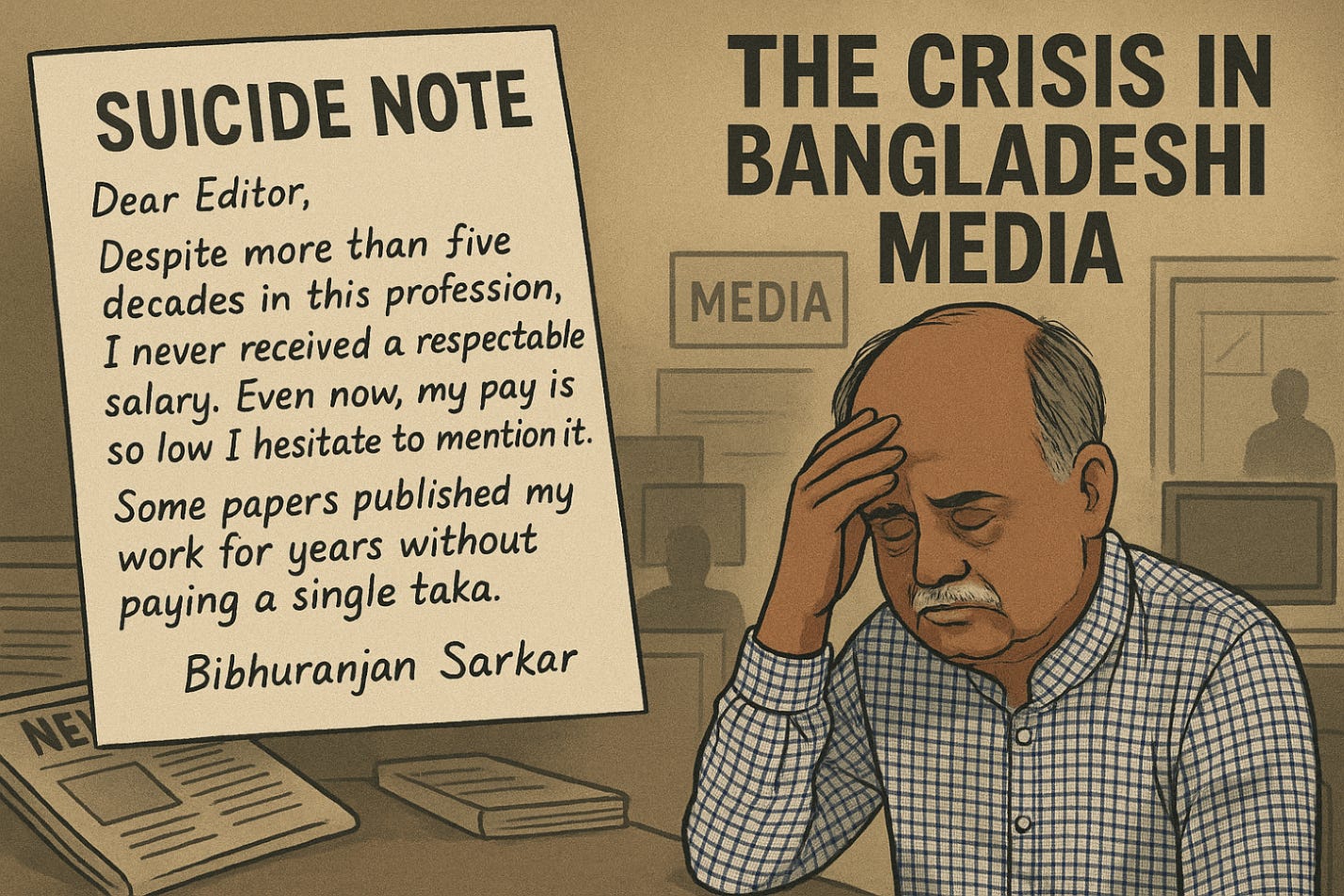Bibhuranjan’s Suicide Note and the Crisis of Media in Bangladesh
A journalist’s final note exposes Bangladesh’s media crisis, including low pay, misconduct, political pressure, and fading ethics, calling for reform and renewed commitment to truth in journalism.
সাংবাদিক বিভুরঞ্জন সরকারের আত্মহত্যার নোট বাংলাদেশের গণমাধ্যমের গভীর সংকট উন্মোচন করে। এতে দীর্ঘস্থায়ী স্বল্প বেতন, ন্যায্য বেতন নীতির অভাব, প্রাতিষ্ঠানিক অসদাচরণ, রাজনৈতিক হস্তক্ষেপ ও সাংবাদিকতার কাঙ্ক্ষিত নীতির অনুপস্থিতি স্পষ্ট হয়েছে। তার শেষ কথাগুলো সাংবাদিকতাকে আর্থিক শোষণ ও রাজনৈতিক প্রভাব থেকে মুক্ত করে সত্য প্রকাশ ও সামাজিক দায়বদ্ধতার আহ্বান জানায়।
The tragic death of journalist Bibhuranjan Sarkar became a talk of the town, particularly because his suicide note was published as an opinion piece in a top online news portal. The note sparked new conversations, reflections, and realizations within the journalist community about the state and future of the country’s journalism profession. Some discussions centered on the deep-rooted crises of media institutions and their internal media policies, while others highlighted government and political party interference that severely undermines independent journalism. In this piece, I focus on Bibhuranjan Sarkar’s final letter, published in bdnews24.com on August 22, 2025, as his last article.
His write-up identifies two major crises affecting the journalism profession, journalists, and media institutions. The first is an organizational crisis that has developed and deepened over the years but remains largely unaddressed. With the publication of this letter, the longstanding loopholes in Bangladeshi media have come to light.
It is evident that journalists in Bangladesh chronically underpaid. To its worst, there is little to no policy implementation to protect them. Most newspapers do not follow the government-announced wage board. In his letter, Bibhuranjan wrote, “Despite more than five decades in this profession, I never received a respectable salary. Even now, my pay is so low I hesitate to mention it.” He further added, “Some papers published my work for years without paying a single taka.” These words capture the persistent final neglect of journalists and the structural conditions that leave them more vulnerable to hardship and exploitation.
This climate of fear, marked by career stagnation and lack of growth, affects journalists from the very beginning of their profession. As a result, many journalists become deeply disillusioned about their lives and futures, some even leaving journalism midway through their careers.
Not only that, Bangladeshi media organizations also suffer from widespread miscommunication and professional misconduct between journalists and administrative high-ups. Most newspapers lack integrity in their institutional practices, leaving internal politics and injustice deeply-rooted in the media system. At the same time, many journalists maintain strong and unwavering political affiliations, further complicating the profession.
Conversely, the government also wants to use journalists as their party loyalists, frequently interfering with newsroom policies when reports are unfavorable. Such interference ultimately silences the truth and undermines editorial independence. In his final piece, the late journalist also noted the troubling tendency of some colleagues to display unconditional loyalty in exchange for government favors such as land, plots, cash, or foreign trips.
The second major concern raised in the letter is the serious decline in journalistic morality. As Bibhuranjan wrote, “My profession has taught me that telling the truth means taking risks with courage,” but the reality has changed. He described friends who compromised their moral positions, and admitted that he too once tried to align himself with political leaders for material gain but failed. “Many changed their fortunes by writing books on Sheikh Mujib and Sheikh Hasina. He observed. Yet for his own works, two books published by Agamee Prakashani, he lamented, “I did not receive even two taka in royalty.” His reflections expose how many journalists today serve power, not people.
To sum up, Bibhuranjan’s final letter exposes the deep misconduct within journalistic institutions. Addressing these crises requires confronting financial exploitation, political interference, organizational injustice, and patronage-based favors from government, political parties, or other power holders. At the same time, journalists themselves must embrace truth-telling, exercise social responsibility, resist corruption, and write with conscience rather than concession.
About the Authors:
Md. Sajedul Islam is a Ph.D. researcher at the School of Media and Communication, The University of Southern Mississippi, USA. Contact Sajedul Islam at m.sajed2k@gmail.com
Tanjila Islam is a Research Fellow at Bangladesh Islamic Law Research and Legal Aid Center. Contact Tanjila Islam at tanjilazarinhs@gmail.com.
Disclaimer: The views expressed in this article are the author's own and do not necessarily reflect The Insighta's editorial stance. However, any errors in the stated facts or figures may be corrected if supported by verifiable evidence.





